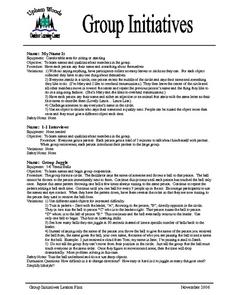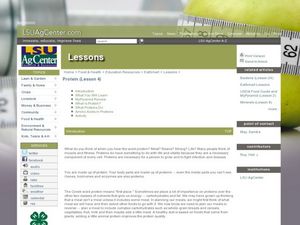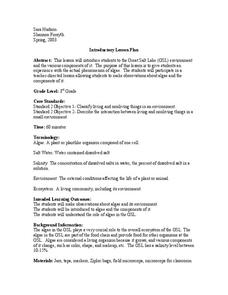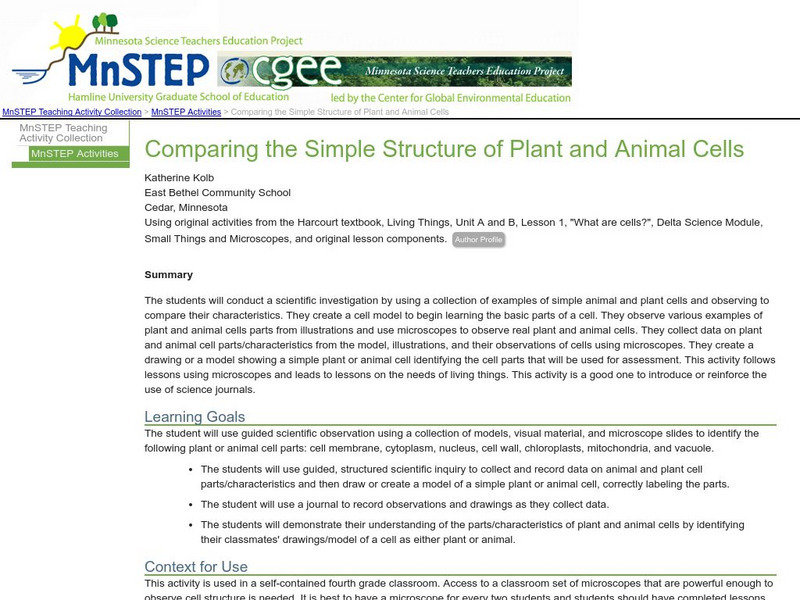Curated OER
Meat, Poultry, Fish, Eggs: Constructing and Maintaining
Students investigate meat as a source that provides protein, iron and nutrients in the diet. They identify types of meat and their sources, complete a market survey, conduct a fried egg experiment, and prepare various recipes that...
Curated OER
Group Initiatives
Students explore the names and qualities about members in the group. They each say their name and something about themselves. Students gather around in a circle. They listen to the teacher as he or she says the name of someone and throws...
Curated OER
The Beagle Brigade
Students brainstorm how to handle conflict scenario. In this character education instructional activity, students read a story and respond as to how the characters should handle the conflict. Students examines feelings...
Curated OER
Shells
Sixth graders label diagrams of the 6 different classes of mollusks and explain the meaning of the labeled terms. They identify 8 common New Haven shells. They organize their own shell collection during this series of lessons.
Curated OER
Discovering Owls
Students are introduced to different types of owls and owl pellets. They list several adaptations that benefit the owls. Students identify the various species of owl that live in Wisconsin. Students discuss owl pellets and identify the...
Curated OER
Molecular Evidence for Evolutionary Relationships
Learners compare the amino acid sequences in cytochrome-c for a variety of organisms and use this information to infer evolutionary relationships. Students investigate the role of homeobox genes and what this indicates about the...
Curated OER
Fossil Impressions of Ancient Life
Students make a mold using Plaster of Paris and then make a cast using that same mold. They pick a fossil and describe how it looks. They write a fictionalized story about its life, or burial. (
Curated OER
The Three Worm Phyla
Ninth graders examine the three worm phyla. In this classification lesson, 9th graders observe, compare and contrast the planarian, tapeworm, and fluke.
Curated OER
COMMON KINDS OF INSECTS
Students will recognize and name three common insects.1. Share background information with students. 2. Provide students with the "bug body" puzzle pages, and have them cut the puzzles out.1. Share background information with students....
Curated OER
CLOTHESLINE SLEUTH
Students will trace origins of various forms of clothing to their agricultural sources.String a cotton cord across the top of a blackboard to resemble a clothesline. 2. Bring a variety of clothing articles to class made from a variety of...
Curated OER
The Energy of Life in Zebrafish
Students study the stages of development of an unknown organism. In this zebrafish lesson, students examine and collect data as they use microscopes to view a zebrafish embryo.
Curated OER
Protein
Students examine protein, what it is and how it functions in the body. In this protein lesson students study the food pyramid, what a protein is and what it does.
Curated OER
LISTENING TO DIRECTIONS
Students view farm objects or products made from farm animals and follow the oral instructions given by the teacher. They are given worksheets, there are three sets of directions for the one worksheet. Students worksheets have everything...
Curated OER
Wandering Wild-oats
Students observe wild-oat seeds. In this biology lesson, students watch how wild-oat seeds react to moisture and draw conclusions and make predictions.
Curated OER
Great Salt Lake
Third graders are introduced to the Great Salt Lake (GSL) environment and the various components of it. They make observations about algae and its environment and discuss why it is considered a living organism and various components of...
Alabama Learning Exchange
Alex: Edible Cell
As part of the study on Life Processes, the young scholars will watch a video clip at Cells Alive to see a model of the cell and its components. The students will use edible products to create an animal cell. Each product will represent...
Science Education Resource Center at Carleton College
Serc: Comparing the Simple Structure of Plant and Animal Cells
Students use guided scientific observation using a collection of models, visual material, and microscope slides to identify cell organelles. Then they demonstrate their understanding of the parts/characteristics of cells by identifying...
Alabama Learning Exchange
Alex: Those Cells Look Good Enough to Eat.
This is a student led activity utilizing visualization and association to memorize the parts of animal and plant cells. Young scholars will work cooperatively to develop drawings to connect the parts of cells to one of their favorite...
TeachEngineering
Teach Engineering: Cell Membrane Structure and Function
Young scholars learn about the different structures that comprise cell membranes, fulfilling part of the Research and Revise stages of the legacy cycle. Students view online animations of cell membrane dynamics (links provided). Then...
Alabama Learning Exchange
Alex: Mitosis: Divide to Survive
This instructional activity includes a Power Point presentation that will guide the young scholars through an investigation of mitosis, or cellular division. The instructional activity will review the basic functions and parts of animal...




















